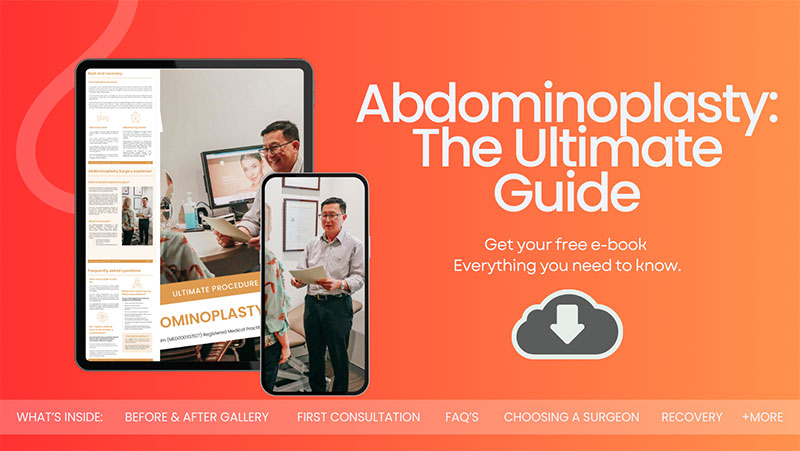What to Expect if You Get Pregnant after Getting an Abdominoplasty
Abdominoplasty, commonly known as a “tummy tuck,” is a surgical intervention that helps people get rid of the excess skin on the abdominal wall and can strengthen abdominal muscles (if needed). While the procedure has gained acclaim for its benefits, it’s crucial to consider its implications if you’re planning to become pregnant in the future. Pregnancy after abdominoplasty comes with its own set of challenges, questions, and concerns that you should be aware of.
In this blog, we’ll discuss seven essential things you need to know if you’re contemplating pregnancy after undergoing an abdominoplasty, from understanding the ideal timing and physical changes to expect, to discussing potential risks and the importance of consulting your plastic surgeon. Whether you’ve already had the surgery or are considering it, this blog aims to provide you with the information you need to make informed decisions about your body and your future family.
Dr Lim’s 2024 Abdominoplasty Guide

Dr Jake Lim is a highly qualified and experienced plastic surgeon based in Sydney, Australia, with an interest in facial, breast, and body contouring post weight-loss surgery. With a focus on achieving the optimal results for his patients, Dr Lim is committed to ensuring that each patient is well-informed about available treatments and procedures. Dr Jake Lim brings 23 years of surgical experience to the table, offering a wide range of procedures at My Klinik locations in Castle Hill and Westmead. The practice prides itself on providing compassionate care in a supportive environment.
What Is Abdominoplasty?
Abdominoplasty can flatten the abdomen by removing excess fat and skin and tightening the muscles in the abdominal wall. This surgery is often sought after by individuals who have experienced significant weight loss or pregnancy.
The procedure involves making an incision along the lower abdomen, just above the pubic area, to remove excess skin and fat. The abdominal muscles are then tightened, and the remaining skin is pulled taut, creating a smoother, flatter appearance. Depending on the extent of the surgery, the procedure can take anywhere from two to five hours and will require overnight stays in the hospital.
It’s important to note that abdominoplasty is not a weight-loss solution but rather a body-contouring procedure. Candidates for this surgery are generally those who are in good health, have a stable weight, and have realistic expectations about the results.
While abdominoplasty can offer good results, it’s crucial to be aware of its implications, especially if you’re considering future pregnancies. The surgery can have a lasting impact on your body, and understanding how pregnancy might affect these results is essential for making an informed decision.
What You Should Know about Pregnancy after Abdominoplasty
1. Timing Matters.
If you’re contemplating pregnancy after undergoing an abdominoplasty, one of the first steps should be a consultation with your plastic surgeon. The timing of your pregnancy post-surgery is a critical factor that can significantly impact both your health and the results of the abdominoplasty. Dr Lim recommends waiting at least one year after the surgery to consider getting pregnant. This waiting period allows your body enough time to recover fully, ensuring that the surgical incisions have healed and that your abdominal muscles are back to their optimal state.
Pregnancy too soon after an abdominoplasty could compromise the surgical results, leading to the stretching of the newly tightened skin and muscles. Additionally, a rushed timeline may pose risks such as wound dehiscence (where the surgical wound reopens) or increased discomfort during pregnancy. Therefore, it’s crucial to adhere to the recommended waiting period to minimise these risks.
2. Physical Changes Are Inevitable.
Pregnancy is an experience that brings about numerous changes to your body, including your abdomen. If you’ve had an abdominoplasty, it’s essential to understand that the results of the surgery will likely be affected to some extent. Pregnancy naturally stretches the abdominal muscles and skin to accommodate the growing foetus. This stretching can alter the tight, flat appearance achieved through the abdominoplasty.
While the extent of these changes varies from person to person, it’s wise to prepare mentally for some level of alteration in your abdominal appearance. Some women find that they can regain much of their pre-pregnancy form through exercise and a healthy diet, but individual results can vary.
3. Risks and Complications Can Occur.
While abdominoplasty is generally considered safe and doesn’t pose significant risks during subsequent pregnancies, it’s crucial to be proactive about discussing any concerns with your plastic surgeon. Some women may experience discomfort around the surgical area or issues related to scar tissue during their pregnancy.
Potential complications could include hypertrophic scarring, where the scar becomes thick and raised, or keloid formation, a more severe form of scarring that extends beyond the original incision. These issues could cause discomfort or aesthetic concerns that may require further medical attention.
Therefore, it’s essential to have a comprehensive consultation with your plastic surgeon to discuss these risks and any other concerns you may have. This will allow you to make well-informed decisions and take any necessary precautions to ensure a healthy pregnancy.
4. You Should Consult Your Doctor.
Before you even start planning for a pregnancy, it’s imperative to consult your healthcare provider for a comprehensive evaluation. This evaluation is not just a routine check-up; it’s a detailed assessment that may include a variety of tests or screenings. These could range from blood tests to check for any deficiencies or imbalances, to ultrasounds that examine your abdominal area, particularly focusing on any changes post-abdominoplasty. The goal is to ensure that you’re in the best possible health condition for a safe and healthy pregnancy. Your plastic surgeon can also provide personalised advice on how to manage your abdominoplasty results during and after pregnancy.
5. The Body Changes after the Pregnancy.
After giving birth, your body will naturally go through a series of changes as it adjusts back to a non-pregnant state. For those who have had an abdominoplasty, these changes can be particularly noticeable in the abdominal area. While some women find that their bodies return to a state similar to their post-abdominoplasty condition, this is not always the case. Factors like weight gain during pregnancy, the natural stretching of skin, and changes in muscle tone can all affect your surgical results.
6. There Are Emotional and Psychological Aspects to Consider.
Pregnancy after abdominoplasty is not just a physical journey but an emotional and psychological one as well. The changes your body undergoes can evoke a range of emotions, from excitement to anxiety. It’s natural to have mixed feelings, especially if you’ve invested time, money, and emotional energy into improving your physical appearance through abdominoplasty. Open and honest communication with your partner and plastic surgeon is crucial during this time. They can offer both emotional support and practical advice, helping you navigate the complexities of this period.
7. Financial Considerations Should Be Taken into Account.
If you’re contemplating undergoing another abdominoplasty or additional cosmetic procedures after your pregnancy, it’s crucial to be fully aware of the financial implications. Cosmetic surgeries are typically not covered by insurance, making them an out-of-pocket expense. Therefore, it’s essential to have a clear financial plan in place. Consider consulting a financial advisor to help you budget for these expenses, ensuring that you’re making informed decisions that won’t strain your financial health.
FAQs about Abdominoplasty

Who is a good candidate for abdominoplasty?
- Good candidates for abdominoplasty are individuals who are in good overall health, have a stable weight, and possess excess skin or fat in the abdominal area that doesn’t respond to diet and exercise. It’s also important to have realistic expectations about the results.
How long is the recovery period?
- The recovery period varies from person to person but generally ranges from two to six weeks. Patients are advised to avoid strenuous activities and follow post-operative care instructions for optimal healing.
Will the scars be visible?
- Scarring is an inevitable part of any surgical procedure. However, the scars from an abdominoplasty are usually located along the lower abdomen, making them easy to conceal with clothing or swimwear.
Can I get pregnant after abdominoplasty?
- Yes, it’s possible to get pregnant after abdominoplasty, but it’s advisable to consult your healthcare provider and plastic surgeon for personalised advice. Pregnancy can alter the results of the surgery, so timing and planning are crucial.
Is abdominoplasty covered by insurance?
- Abdominoplasty may be covered by insurance if it satisfy certain criterias. You can call Dr Lim’s rooms for more information.
What are the risks involved?
- Like any surgical procedure, abdominoplasty comes with risks such as infection, bleeding, and complications related to anaesthesia. It’s essential to discuss these risks in detail with your plastic surgeon to make an informed decision.
Further Reading about Body Surgery with Dr Jake Lim
- Read Dr Lim’s Extended Abdominoplasty Surgery Page
- Read Dr Lim’s Post Pregnancy Procedures
- Read Dr Lim’s Abdominoplasty Surgery Page
- Read Dr Lim’s Blog about Split Muscles after Pregnancy – Diastasis Recti
- See Dr Lim’s Abdominoplasty Photo Gallery
- Read Dr Lim’s Blog about How to get rid of FUPA – Fat Upper Pubic Area
- Read Dr Lim’s Blog about Will Medicare Cover My Labiaplasty in Sydney?
Medical References about Abdominoplasty
About Dr Jake Lim
Highly qualified and experienced specialist plastic surgeon Dr Jake Lim focuses on facial plastic, cosmetic breast and body contouring after significant weight loss
Dr Lim creates the best possible plastic surgery results for his Australia-wide and international patients.
Dr Lim is passionate about making sure each and every patient has access to the right information about available treatments and procedures and is able to make well-informed decisions.
At My Klinik, patient safety, education and achieving optimal results are our top priorities.




